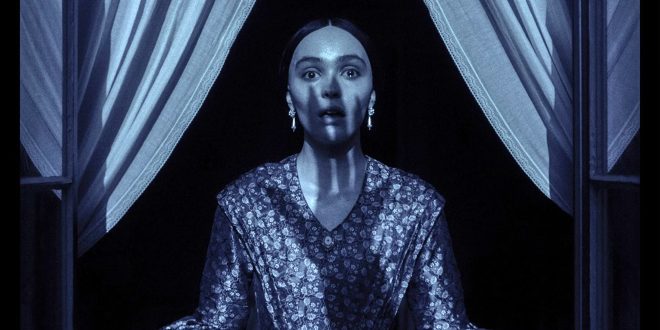At times faithful to the horrifyingly sensational 1922 silent film “Nosferatu: A Symphony of Horror”, directed by F. W. Murnau (1888-1931), adaptation of Bram Stoker’s “Dracula”; director Robert Eggers interaction seethes with titillation, tools of the contemporary and gorgeous, gory cinematography. German Expressionism pulsating at the core of 1922’s masterpiece is tempered with the six elements evident in the films of Robert Wiene’s “The Cabinet Dr. Caligari” (1920) and Fritz Lange’s “Metropolis” (1927): distorted sets, chiaroscuro lighting, madness, dread. Shadows define the “terrifying” in the myriads of Vampire films; Eggers’, portrait is a grand, electrifying, disturbing and eerily enthralling film. I found Werner Herzog’s 1979’s “Nosferatu the Vampire” a pure, reverent facsimile, a must-see comparison to the original and “Nosferatu”, a chilling homage to F. W. Murnau.
Unique to “Nosferatu” is the character of “Ellen Hutter” (perspicacity depicted by Lily-Rose Depp), wife of “Thomas Hutter” (Nicholas Hoult, is excellent as the ensnared, lovesick scapegoat); she is no longer the innocent sacrificed victim but culpable in the awakening of Count Orlok’s (Bill Skarsgard, magnificently repellent) lust and his triumphant march into the fictional town of Wisborg, Germany in 1838; rats take center stage in all variations of Nosferatu, harbingers of pestilence, plague and death; omnipresent cats, seemingly benign, symbolize an animalistic reference to vampires. Mythology claims “Absalom” as the patron god of all vampires; mystifying as to the adoration of a creature whose sole existence relies on sucking the blood of others, until exsanguination.
There is a freedom actualized in this archival scenario, sexual fantasies corseted in the Industrial Revolution, restrictive, limited are realized in “Nosferatu”; Ellen Hutter unwittingly shares the limelight with 2024’s “Anora”, “Emilia Perez”, “Babygirl”; she succeeds in allowing her fantasies to determine her destiny and satiate a withering prurient desire and a requited promise.
Eggers is a talent whose insight and gift float smoothly in tandem with Bram Stoker’s (1847-1912) prescient, nightmarish sensitivities, vacillating between what is real and the haunting, cryptic possibilities of the existence, power of a nonfictional, tangible, tempting Vampire.
FOUR STARS!!!!
Peneflix
 Peneflix MOVIE REVIEWS BY PENEFLIX
Peneflix MOVIE REVIEWS BY PENEFLIX





